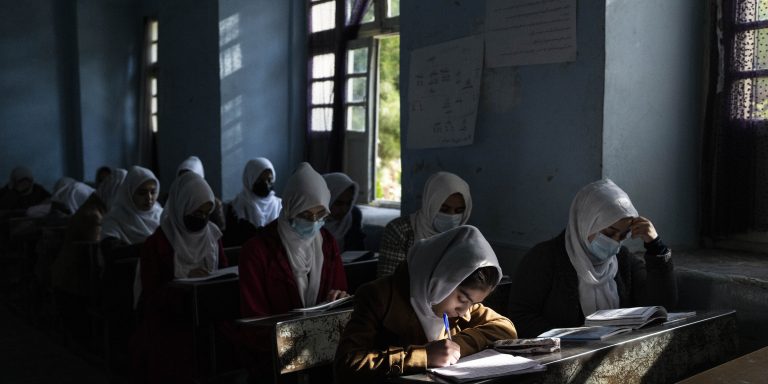INTELBRIEF
April 8, 2022
IntelBrief: The Taliban Continue to Deny Afghan Girls the Right to an Education

Bottom Line Up Front
- Girls in Afghanistan above the sixth grade are not allowed to attend school, following the Taliban’s Ministry of Education decree closing girls’ schools until further notice, after initially opening them for a mere few hours.
- Despite a half-hearted public relations makeover after sweeping to power in August 2021, the Taliban remains, in its repressive societal expectations, the same group that it has always been.
- Even as the Taliban craves political legitimacy, its approach to female education completely undermines its political legitimacy with many countries around the globe.
- Education is a fundamental right, and Western countries should enact punitive measures, to include sanctions, until the Taliban allows female education and the basic human rights of Afghan women.
After being shuttered for the past several months, high schools for Afghan girls opened in late March, just to be closed again after only a few hours. Girls above the sixth grade are unable to attend school, following the Taliban’s Ministry of Education decree closing girls’ schools until further notice. Secondary and high school education for girls is now banned, and even primary schools for young girls are not open in many provinces throughout Afghanistan. The Taliban remain ideologically rigid, austere, and opposed to basic rights for women and girls. There are other challenges to education in Afghanistan, as well, especially considering the “brain drain” that followed the Taliban’s takeover. The school closures stand in contrast to an earlier Taliban pledge, by which the group said that girls ages 12 through 19 would be able to attend school, as long as the schools operated in accordance with Islamic principles. This reversal is in line with the Taliban’s draconian approach to women’s involvement in society across the board, including in education, government employment, clothing and appearance, and independent mobility.
Despite a half-hearted public relations makeover after sweeping to power in August 2021, the Taliban remains the same group in its repressive societal expectations that it has always been. After settling back into the governance role for the first time in more than two decades, Taliban leaders are still attempting to find their footing, but at their core, the group’s ideology remains unchanged. This is the case even as the Taliban recently announced a prohibition on cultivating opium poppy, but many are skeptical that the ban is anything more than an attempt to placate the international community. In reality, the move is likely a Taliban effort to gain further control over the illicit opium trade, including bringing Afghan farmers currently outside of the Taliban’s reach into the fold, ensuring maximum compliance and tax enforcement. There will be other attempts to present a more pragmatic face, but it is crucial for the international community to remain focused on the Taliban’s actions, not simply its words, which are often empty.
While the crisis in Ukraine has captured much of the world’s attention, in Afghanistan, the Taliban’s leadership has been receiving dignitaries, diplomats, and high-ranking policymakers from around the world. Taliban leaders have met with Chinese and Turkish officials. There are a number of countries that will be willing to overlook the Taliban’s mistreatment of women and girls, but the United States and its allies must stand in strong opposition to such practices. Even as the Taliban craves political legitimacy, its approach to female education completely undermines its political legitimacy with many countries around the globe, including with countries that the Taliban will need to convince if the regime is to ever receive formal recognition.
If the Taliban is ever hoping to rebuild the Afghan economy, denying half of the population access to education is not only immoral; it is counterproductive. Such discriminatory policies are also a violation of the Convention on the Elimination of All Forms of Discrimination Against Women, the International Covenant on Economic, Social and Cultural Rights, and the Convention on the Rights of the Child—to all of which Afghanistan remains a state party. Girls’ education is not a bargaining chip to be traded for political gain or control. Education is a fundamental right, and Western countries should enact punitive measures, to include sanctions that account for humanitarian exemptions, until the Taliban allows female education and the basic human rights of Afghan women.